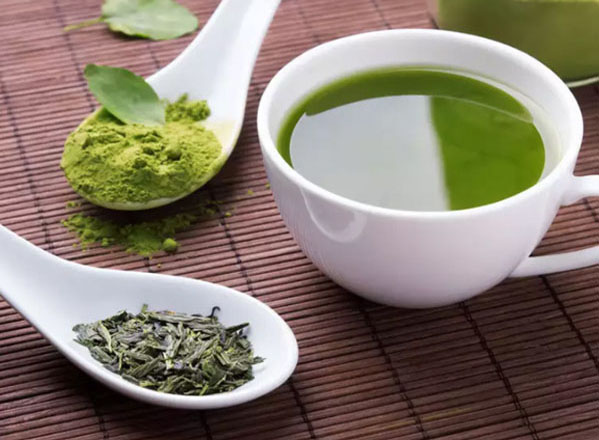Green tea hasn’t always been just a pleasant drink. It has a long history of medicinal uses dating back over 3,000 years.
Most people don’t realize it, but both black and green tea are brewed from the dried leaves of the same plant—Camellia sinensis. It is the level of oxidation of the leaves that determines the type of tea.
Green tea is made from unoxidized leaves and is one of the least processed types of tea.
And, while both black and green tea are used medicinally in Eastern countries, in the West it is green tea that is recognized for containing the higher amount of disease-preventing polyphenols.
Ancient cultures from Japan to Iran—and virtually all the countries in between—made wide use of green tea for its healing properties.
The diverse traditional uses included digestive aid, heart health support, mental health support, energy promotion, regulation of body temperature, and control of bleeding and wound healing.
Modern studies in the West have demonstrated that green tea provides positive effects on type 2 diabetes, liver disorders, Alzheimer’s disease and weight loss.
In the sphere of weight loss, two noteworthy studies in 2023 added weight to the existing evidence of green tea’s weight management properties.
Study 1: Helps regulate gut microbiota
Noting that unhealthy intestinal microflora is linked to obesity and metabolic syndrome, researchers in China conducted a mouse study to see if green tea components helped regulate the gut microbiota and aided weight loss.
The researchers randomly assigned healthy mice to one of five equal groups: Low-fat diet, high-fat diet, and high-fat diet with 1%, 2% or 4% green tea infusions. The test period was eight weeks.
Meanwhile, to evaluate the effect of the green tea components on the regulation of the gut microbiota, the researchers conducted a parallel study with a second group of mice. This group was divided between low-fat, high-fat, high-fat with tea polyphenols, high-fat with L-theanine and high-fat with caffeine groups.
Writing in the study conclusions, the researchers reported: “In summary, we observed a distinct clustering pattern of gut microbiota in mice fed a high-fat and green tea infusion diet.
“A four percent green tea infusion significantly increased intestinal microflora in obese mice and reduced high-fat diet-induced metabolic alterations by preventing metabolic disorders associated with the disrupted microflora.”
Although the researchers determined that tea polyphenols were primarily responsible for restoring the bacterial community essential for anti-obesity stimulation, they noted that caffeine and L-theanine played a supporting role by altering their own genera of obesity-associated biomarkers.
The research was published in the journal Foods in August 2023.
Study 2: Green tea helps regulate obesity-related hormones
After citing the evidence supporting use of green tea extract for a range of conditions, the Iranian researchers noted the existing evidence proving green tea’s weight-managing benefit was less substantive.
To settle the question, the researchers, based at the Tehran University of Medical Sciences, conducted a meta-analysis of existing research.
The team reviewed 59 eligible studies involving 3,802 participants. The studies were identified through a search of the PubMed, Web of Science and Scopus databases through July 2022.
The researchers’ stated goal was to determine the effects of green tea extract supplementation on body composition by measuring all aspects of weight and body fat ratios. The “obesity-related hormones” measured by the researchers included leptin, adiponectin and ghrelin. Finally, malondialdehyde was measured to determine oxidative stress.
After reviewing the 59 studies, the researchers reported the evidence was clear that green tea provided a measurable benefit for weight management.
“Our findings underlined that green tea extract supplementation has potential anti-obesity properties in both anthropometrical and hormonal aspects,” the researchers wrote in the study conclusions. “This systematic review and meta-analysis highlighted that green tea extract supplementation significantly decreased body mass, body mass index, body fat percentage and malondialdehyde, while increasing total antioxidant capacity and adiponectin.”
While noting that the anti-obesity benefit of green tea is not as well-established as other green tea health benefits, the researchers were nonetheless adamant regarding the potential: “Coaches and nutritionists could recommend moderate consumption of green tea extract in athletes and patients with obesity as a part of their lifestyle modification interventions.”
The study was published in the British Journal of Nutrition in November 2023.
Due to the wide array of health benefits derived from green tea it is included in a number of Optimal Health Systems product blends:
• Weight Reduction Package
• Exposure Protection Pak
• Optimal Defense
• Opti-Brain
• Opti-Immune VRL
• Optimal B Awake
• Brain Tap Pak
– – –
Source: Foods (MDPI.com), British Journal of Nutrition, Wikipedia (Camellia-sinensis).



